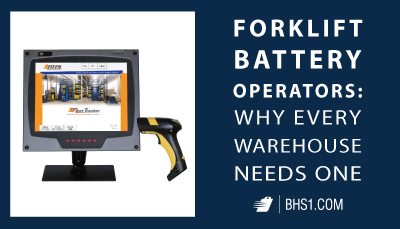We use cookies to make your experience better. To comply with the new e-Privacy directive, we need to ask for your consent to set the cookies. Learn more.
Forklift Battery Operators: Why Every Warehouse Needs One
Companies that run one or two electric lift trucks generally rely on forklift operators to change batteries. As the fleet begins to grow, however, it starts to make more sense to create a new position at the warehouse: the forklift battery operator, sometimes also called a battery room manager or even a battery changer (note that we reserve that last term for material handling equipment designed for the task).

The professional who occupies this position does more than change forklift batteries (preferably using an Operator Aboard Battery Extractor). They’re also responsible for cleaning and maintaining batteries and chargers, as well as tracking usage statistics on the fleet. They use fleet management software to strategically choose forklift batteries for each change. In the event of boil-over or electrolyte spills, it is the battery operator who cleans the area.
For companies that rely on a fleet of electric forklifts, it makes more sense to hire a battery room manager than to rely on forklift operators for all the tasks involved in using and caring for this technology. And even though employers may be loath to add another salary to the payroll, hiring a battery operator can save considerable sums in the long run.
How Battery Room Operators Provide a Consistent ROI
Forklift batteries are expensive, with higher-end options in the five-figure range. Often, they make up a sizable share of any company’s initial capital investments. Managers should treat industrial batteries as the assets they are, not as afterthoughts. When employees who have a different primary purpose — operating forklifts to pick or put away orders, for instance — battery care will always come in second.
Not only will a dedicated battery operator improve maintenance and care for the stock, extending working life spans and preventing expensive repairs, they may enable companies to buy fewer batteries and chargers in the first place.
Forklift battery operators are also responsible for operating management systems like Fleet Tracker. This software tracks data on forklift batteries, including usage, charging time, and maintenance schedules. By studying battery usage over time, these employees can easily determine whether the company needs more batteries and chargers — and when they can afford to sell off some of their stock.
These benefits justify the business expenditure alone, while getting forklifts out of the battery room and back in the aisles faster than ever. Ultimately, productivity gains and direct cost reduction in battery maintenance and replacement make this position a strong business decision for many forklift users.
Forklift Battery Operators Protect Investments and Improve Productivity
When a single person is responsible for keeping a stock of batteries ready for material handling equipment; when that person is highly trained and experienced with every piece of equipment in the battery room; and when that person knows the history and idiosyncrasy of every battery in the stands, the entire operation benefits.
Forklift operators don’t have to change batteries mid-shift due to power loss. Order pickers don’t have to wait in long lines for new batteries. In fact, with an Operator Aboard Battery Extractor, a trained battery room manager can get trucks in and out in just a few minutes.
These productivity benefits add up. If you use electric forklifts for mission-critical tasks, it makes sense to hire a battery operator as soon as possible.
References:
Rizzo, Dave. “Powered Vehicles: Hidden Cash in the Battery Room.” MHLNews. Informa USA, 1 Mar. 2009. Web. 29 Oct. 2018.
